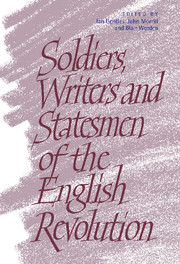Book contents
- Frontmatter
- Contents
- Preface
- Austin Woolrych: an appreciation
- 1 Secret alliance and Protestant agitation in two kingdoms: the early Caroline background to the Irish Rebellion of 1641
- 2 Of armies and architecture: the employments of Robert Scawen
- 3 George Digby, Royalist intrigue and the collapse of the cause
- 4 The iconography of revolution: England 1642–1649
- 5 The casualties of war: treatment of the dead and wounded in the English Civil War
- 6 ‘A bastard kind of militia’, localism, and tactics in the second civil war
- 7 Cromwell's commissioners for preserving the peace of the Commonwealth: a Staffordshire case study
- 8 Colonel Gervase Benson, Captain John Archer, and the corporation of Kendal, c. 1644—c. 1655
- 9 Repacifying the polity: the responses of Hobbes and Harrington to the ‘crisis of the common law’
- 10 Equality in an unequal commonwealth: James Harrington's republicanism and the meaning of equality
- 11 John Milton and Oliver Cromwell
- 12 From pillar to post: Milton and the attack on republican humanism at the Restoration
- 13 ‘They that pursew perfaction on earth …’: the political progress of Robert Overton
- 14 Locke no Leveller
- A bibliography of the writings of Austin Woolrych, 1955-95
- Index
Austin Woolrych: an appreciation
Published online by Cambridge University Press: 10 November 2009
- Frontmatter
- Contents
- Preface
- Austin Woolrych: an appreciation
- 1 Secret alliance and Protestant agitation in two kingdoms: the early Caroline background to the Irish Rebellion of 1641
- 2 Of armies and architecture: the employments of Robert Scawen
- 3 George Digby, Royalist intrigue and the collapse of the cause
- 4 The iconography of revolution: England 1642–1649
- 5 The casualties of war: treatment of the dead and wounded in the English Civil War
- 6 ‘A bastard kind of militia’, localism, and tactics in the second civil war
- 7 Cromwell's commissioners for preserving the peace of the Commonwealth: a Staffordshire case study
- 8 Colonel Gervase Benson, Captain John Archer, and the corporation of Kendal, c. 1644—c. 1655
- 9 Repacifying the polity: the responses of Hobbes and Harrington to the ‘crisis of the common law’
- 10 Equality in an unequal commonwealth: James Harrington's republicanism and the meaning of equality
- 11 John Milton and Oliver Cromwell
- 12 From pillar to post: Milton and the attack on republican humanism at the Restoration
- 13 ‘They that pursew perfaction on earth …’: the political progress of Robert Overton
- 14 Locke no Leveller
- A bibliography of the writings of Austin Woolrych, 1955-95
- Index
Summary
In the Michaelmas term of 1981 I well remember a lunch-time conversation in the Senior Common Room of Worcester College. My colleagues were gently teasing me because twenty years in Oxford had still not destroyed my inbred Scottish reverence for the title ‘Professor’. I protested that the trepidation I was feeling about my meeting with the formidable and distinguished scholar who was to visit the College Library the next morning was fully justified and I added for good measure that he was a Visiting Fellow of All Souls. This gave everyone pause and then our elderly politics tutor chipped in. He frequently affected Bertie Wooster's style. ‘Oh, I've met him’, he said, ‘and he is rather a swell, but a very good egg – a real gent – you'll like Austin Woolrych’. And, of course, he was quite right. Austin is all of those things and I was to like him very much indeed. As soon as I met him, he put me at ease and almost before I knew it, we were having great fun imagining C. H. Firth's dawning excitement as Henry Pottinger (the highly eccentric Librarian of Worcester in the latter half of the nineteenth century) showed him the Clarke manuscripts for the first time and he realised what a treasure trove he had stumbled on. Not quite Schliemann and the face of Agamemnon perhaps, but when he opened the folio volume bound in smooth brown leather that contains the Putney Debates Firth must have felt that he was hearing, not only the voice of Oliver Cromwell, but also that much more elusive and faint murmur, the voice of the common man.
- Type
- Chapter
- Information
- Publisher: Cambridge University PressPrint publication year: 1998

